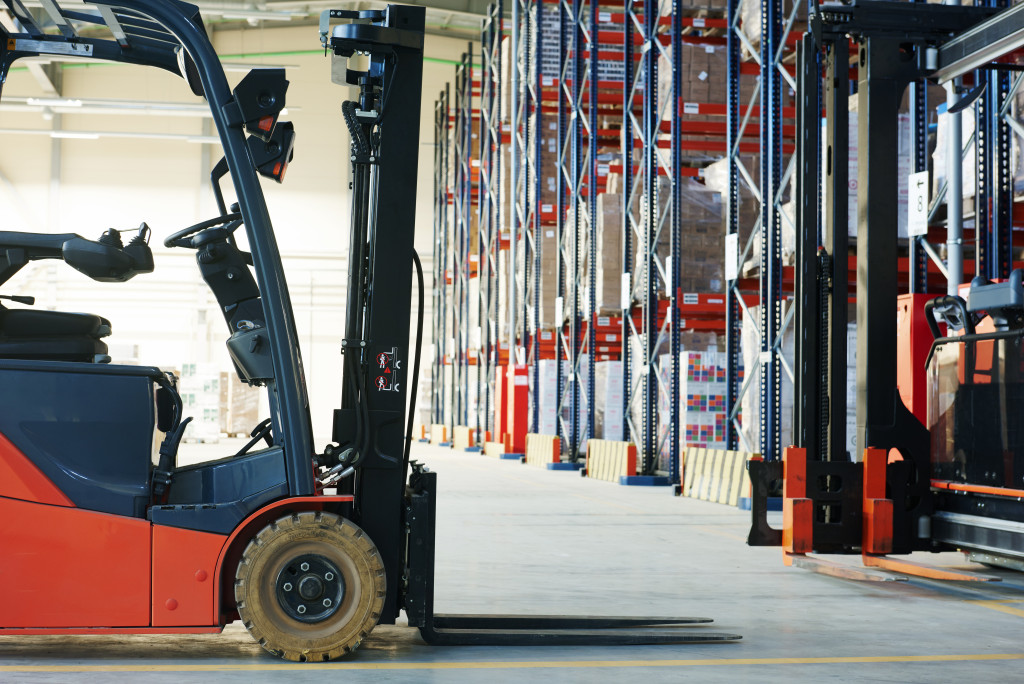- Schedule regular inspections to identify issues and prevent costly repairs.
- Check for worn-out parts, motor issues, corrosion, and lubrication to ensure optimal performance.
- Clean the machinery regularly and check air filters to ensure optimal performance.
- Follow the manufacturer’s instructions for proper use and maintenance.
- Train your employees on the proper use and care of the machinery, and call in professional maintenance services if needed.
Machinery is an essential component of any warehouse or industrial facility. It helps you automate the work processes, boost productivity, and stay ahead of the competition. However, machinery requires regular maintenance to maintain good working conditions and extend its lifespan. Lack of care or improper maintenance can lead to breakdowns, downtime, safety issues, and costly repairs. This post shares some of the best tips for maintaining machinery in your warehouse.
1. Schedule Regular Inspections
Regular inspections are crucial for the longevity and safety of your machinery. Machinery inspections should be performed by trained professionals regularly. Assessments enable you to identify issues before they escalate, costing you time and money. But for simple personal inspections, you should check the machinery thoroughly. Look for the following problems:
a. Worn-out parts
If you find any worn-out parts, replace them immediately. Worn-out parts can cause the machinery to run inefficiently, leading to breakdowns or accidents. Some parts that should be checked include hoses, belts, lubricants, and filters. These parts should be replaced as soon as possible to prevent further damage.
b. Motor issues
Many motor-related issues can cause the machinery to break down. Make sure all motors are running correctly and that all connections are secure. Checking for unusual vibrations and noises can help you identify motor issues before they become a bigger problem. You can use a compact remote vibration sensor to detect the minute vibrations from your motors. This can help you diagnose issues before they become expensive repairs.

c. Corrosion
Corrosion can occur over time in machinery exposed to moisture or other elements. Check all areas of the machinery for corrosion and rust. Repair the affected parts immediately to prevent further damage if you find any. You can also apply a protective coating to the machinery to reduce the risk of corrosion.
d. Lubrication
Lubrication is essential to keep the machinery running smoothly. Check all the lubricant levels and replace any that are low. Make sure to use the right lubricants for your machinery; this will help extend the life of the parts and prevent wear. Some machinery requires special lubricants, so check the specifications before buying.
2. Conduct Frequent Cleaning
Cleaning your machinery is an integral part of maintenance that is often overlooked. Dirt, grime, and other debris can get into the machinery and cause it to malfunction. Therefore, it is essential to conduct frequent cleaning. Use the correct cleaning agents and follow the recommended cleaning procedures. This helps to ensure that your machinery runs smoothly and efficiently.
You should also check the air filters in your machinery regularly. Air filters can become clogged over time, reducing airflow and causing the machine to run inefficiently. Clean or replace the air filters regularly to maintain optimal performance.
3. Follow the Manufacturer’s Instructions
Following the manufacturer’s instructions is crucial for properly maintaining your machinery. Manufacturers provide guidelines on various things, such as scheduled maintenance, lubrication, and repairs. Reading and following these instructions can help you avoid costly mistakes and prevent accidents.
You should also keep all documentation related to the machinery, such as user manuals and service records. This information can come in useful during inspections or repairs. Store all this information in a safe place and ensure it is easily accessible. If you have multiple pieces of machinery, consider using a software system to keep track of the different documents.

4. Train Your Employees on Proper Use and Care
Your employees are an integral part of your machinery maintenance program. Provide training to ensure they know how to operate the machinery correctly and perform simple maintenance tasks. Teach them the importance of reporting any malfunctions or signs of wear and tear. Proper education is key to preventing accidents, breakdowns, and other mishaps. A safety program should also be implemented to ensure everyone knows the safety protocols and procedures.
5. Consider Professional Maintenance Services
If you lack personnel or specialized skills, consider hiring professional maintenance services to handle your machinery. Professional maintenance services have well-trained and experienced staff that can help you manage your machinery maintenance needs. They can help you keep your machinery running efficiently and extend its lifespan.
Maintaining the machinery in your warehouse is essential for efficient and reliable operations. These tips in your maintenance program can help you avoid accidents, downtime, and costly repairs. Follow the manufacturer’s recommendations, schedule regular inspections, conduct frequent cleaning, train your employees, and consider professional maintenance services for the best results. With proper care and maintenance, you can ensure that your machinery runs smoothly and safely.

